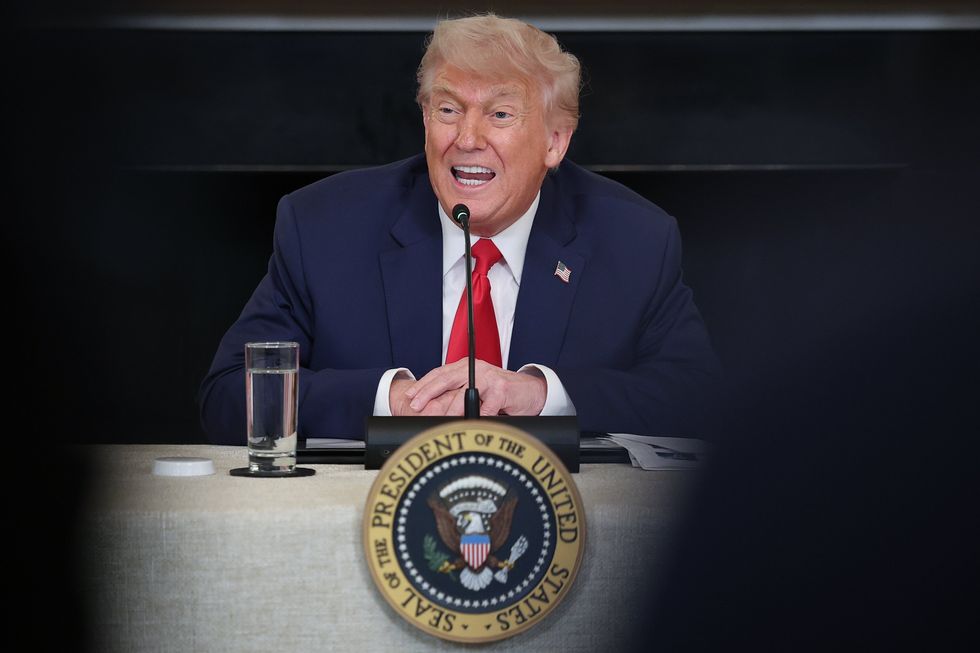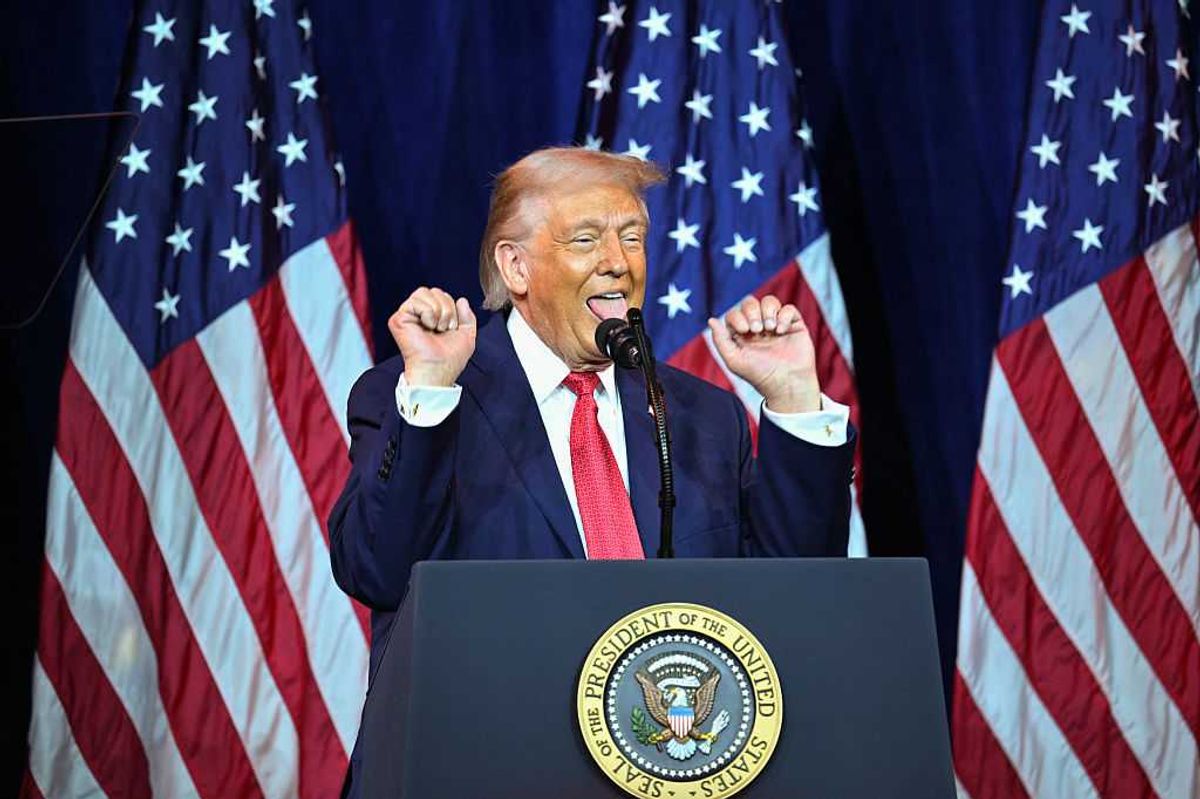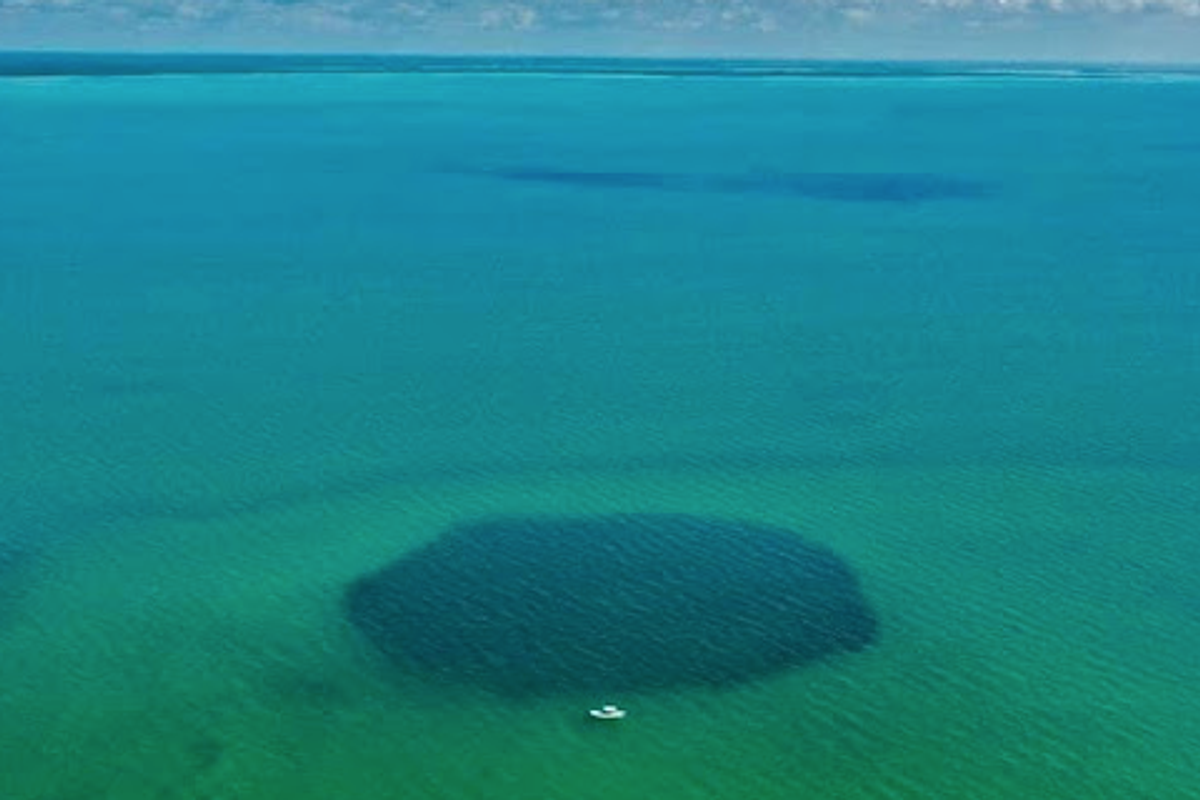Trump
Liam O'Dell
Jun 11, 2025
Donald Trump says he "doesn't know" if he has to uphold constitution
Maven - Meidas Touch / VideoElephant
Back in January, Donald Trump once again swore to “preserve, protect and defend the Constitution of the United States” to the ‘best of his ability’ before becoming president for the second time – but since then, the Republican has made headlines on several occasions for ideas which are completely unconstitutional.
Even before the 2024 presidential election, the businessman was calling for the “termination” of parts of the Constitution on his Truth Social platform as he continued to push his baseless claims around voter fraud in the 2020 election he lost.
In December 2022, he wrote: “A Massive Fraud of this type and magnitude allows for the termination of all rules, regulations, and articles, even those found in the Constitution.”
Things got weird a year later when, in October 2023, Trump’s attorney’s argued a lawsuit in Colorado – that sought to have him disqualified from the state’s presidential ballot under the 14th Amendment clause, which blocks those who “engaged in insurrection” against America from elected office – should be thrown out because he never swore to “support” the Constitution, only to “preserve, protect and defend” it.
Now, not long after Trump marked the first 100 days of his second presidential term, his administration has faced condemnation for considering the suspension of a right afforded to US citizens under the Constitution – and it’s not the first time he’s sought to challenge aspects of the founding document.
We’ve rounded them all up for you below.
LA protests

Trump is currently in hot water amid the ongoing protests against ICE in Los Angeles, California, after deploying 2,700 military personnel to manage the situation.
The protests are against ongoing immigration raids in the city, however, Trump has vowed to use "very big force" should the protests disrupt a military parade on Saturday (14 June).
But is this fair? According to the American Civil Liberties Union: "The First Amendment protects your right to assemble and express your views through protest. However, police and other government officials are allowed to place certain narrow restrictions on the exercise of speech rights."
Birthright citizenship
- YouTube www.youtube.com
Found under the 14th Amendment (yes, the same one with the aforementioned insurrection clause), this concerns people “born or naturalized” in America being considered “citizens of the United States and of the State wherein they reside”.
Prior to his second inauguration, Trump told Meet the Press that “we have to end [the amendment]” and incorrectly claimed America is “the only country that has it”.
Brazil, Canada, Jamaica and Mexico are also among those which provide unconditional birthright citizenship.
The then president-elect also said: “Do you know, if somebody sets a foot – just a foot, one foot – on our land, congratulations, you are now a citizen of the United States of America.
“We’re gonna end that, because it’s ridiculous … if we can, through executive action.”
Sure enough, on his first day in the White House, Trump signed an executive order stating it was US policy “that no department or agency … shall issue documents recognising United States citizenship … to persons: (1) when that person’s mother was unlawfully present in the United States and the person’s father was not a United States citizen or lawful permanent resident at the time of said person’s birth, or (2) when that person’s mother’s presence in the United States was lawful but temporary, and the person’s father was not a United States citizen or lawful permanent resident at the time of said person’s birth”.
However, the executive order has been subject to legal challenges, and on Thursday, the Supreme Court is set to hear arguments concerning Trump’s attempts to end birthright citizenship for children born in the US to certain immigrants.
Due process
Immediately after the sentence about birthright citizenship, the Constitution states: “No State shall make or enforce any law which shall abridge the privileges or immunities of citizens of the United States; nor shall any State deprive any person of life, liberty, or property, without due process of law; nor deny to any person within its jurisdiction the equal protection of the laws.”
This particular section of the US Constitution has gained attention with respect to the US government deporting Maryland resident Kilmar Abrego Garcia to El Salvador – something it admitted happened due to an “administrative error” – and defying a Supreme Court order in April to facilitate his return to the United States.
Before Scotus ruled on the case, Maryland District Judge Paula Xinis reached the same decision and said Abrego Garcia was “apprehended without legal basis … and without due process”.
A third presidential term
The 22nd Amendment is pretty clear on the rules surrounding term limits for US presidents, stating at the start of its very first section that “no person shall be elected to the office of the President more than twice”.
Nevertheless, Trump has repeatedly commented on the idea of getting an unconstitutional third term, and earlier this month, he began selling a Trump 2028 MAGA hat, with the product description calling on customers to “rewrite the rules”.
However, speaking to Kristen Welker of NBC’s Meet the Press last week, Trump insisted he'll be "an eight-year president".
Stating he ‘doesn’t know’ if he needs to uphold the Constitution as president
We’ve already mentioned the oath presidents make at their inauguration, but earlier this month, during the same Meet the Press interview referenced above, Trump was asked: “Don’t you need to uphold the Constitution of the United States as president?”
The answer should have been ‘yes’, but the president instead replied: “I don’t know, I’ll have to respond by saying, again, I have brilliant lawyers that work for me, and they are going to, obviously, follow what the Supreme Court said.”
Attacking law firm Perkins Coie
In March, President Trump signed an executive order taking aim at the law firm which worked with Democrat Hillary Clinton’s 2016 presidential campaign, revoking the company’s security clearances.
When this was taken to court, Washington, D.C. Judge Beryl Howell ruled the executive order was “unconstitutional” and violated the 1st, 5th and 6th Amendments – concerning “viewpoint discrimination”; rights to due process; and rights to counsel, respectively.
Habeas corpus
And finally, just this week, the White House’s deputy chief of staff Stephen Miller said the Trump administration was “looking into” suspending the Constitutional right known as habeas corpus.
Found under Article I of the US Constitution, it states: “The Privilege of the Writ of Habeas Corpus shall not be suspended, unless when in Cases of Rebellion of Invasion the public Safety may require it.”
Habeas corpus translates to English as “you have the body”, and concerns the rights of government detainees to file a court petition to challenge their detention.
Abraham Lincoln suspended it during the Civil War, only for Congress to later pass a statute allowing it.
Miller told reporters on Friday: “The Constitution is clear, and that, of course, is the supreme law of the land, that the privilege of the writ of habeas corpus can be suspended in a time of invasion, so that is an option we are actively looking at.”
At this moment in time, however, America is not experiencing a rebellion or being invaded.
Why not read...- Trump’s four-word question to aide amid bill signing causes concern
- Trump mocked over remarks which show he ‘knows nothing about trade’
Sign up to our free Indy100 weekly newsletter
How to join the indy100's free WhatsApp channel
Have your say in our news democracy. Click the upvote icon at the top of the page to help raise this article through the indy100 rankings.
Top 100
The Conversation (0)














